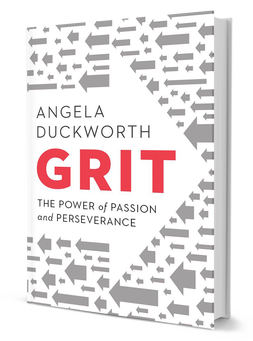 5/5 I expected to enjoy Grit by Angela Duckworth and I did, what I didn’t expect, however, is to find cause to dispute any of the book’s proposals… I’ve known the concept of Grit for ages as my sister is a PhD student in clinical child psychology and as a hobby I read lots of psychology books and many have referred to the concept of Grit. Now, most people would say that I am a stereotypically gritty person and generally, I would agree, however, I started to question this when I read the chapter on how extracurricular activities are a non-gameable indicator for grit. It makes complete sense that if you can stick to an extracurricular activity for a prolonged period of time then you are gritty and the longer you stick to the said activity, the grittier you are…or does it? I have never made a long-term commitment to an extracurricular activity, indeed, besides dabbling in lots of hobbies I have never even been interested in committing to any singular activity for a long time. In my opinion it is much more fun to dabble at a thing then move on once you get bored. This would explain why I have done things like a course in massage, beekeeping, piano, upholstery, life drawing, creative writing and a host of other fun activities but only until the course ends or I get bored. I also read a wide range of books as a hobby but I don’t stick to a genre. But, by nature, because I haven’t committed to any of them I thought well that means I certainly can’t be as gritty as those who commit. But, it then occurred to me that this argument would probably only be of value if I came from a culture that values extracurricular activities and I certainly do not. I learnt the art of deliberate practice at a very young age (although I didn’t know this is what I was doing): when I went to boarding school aged 11 I didn’t have many friends and as I like to use my time productively I decided to engage in studying. I’d take the week’s learnings to the library and go over them. I started writing very detailed study timetables at this age such that by default I’d be in the library from 3.30 to 5.30pm (classes finished at 3.00pm); dinner activities took place between 5.30 and 6.30pm and I’d be back to my studies from 6.30 to 8.30pm; this was delegated prep time. However, whilst most people did their homework at prep time, I usually spent most of this time studying and I did my homework during classes when I got bored or at break time. Sticking to this routine was really quite intense for an 11-year old: getting between classes, my dorm room and the library within 30 minutes required lots of organisation and didn’t allow for much time being wasted on chit chat but I stuck to the routine with a good success rate. Then something weird happened, all my grades started to improve and I noticed so I stuck to the same routine term in, term out. By the end of my second year in high school I went from someone who got a mix of As and Bs to someone who never got Bs. I went from Top 5 in my academic year to always first or second in the class. Mind you, my top competitor became my best friend at this point and we enjoyed healthy competition and moral support from each other. This, getting better and better grades, then became my passion and my mission. It is only in reading Grit that I’ve even sat back and properly considered why I did any extracurricular activities to begin with and I’ve come up with the answer:
At some point in my mid-teens I decided I’d like to go to the University of Cambridge. This was such a lofty goal for someone living in Malawi, one of the 10 poorest countries in the world, I didn’t even know where the money would come from. To anyone I told, it seemed like a complete fantasy and really, it was. But, with continued deliberate practice the goal was achieved and I graduated with 1st class honours although my goal was actually just a 2.1. I decided the moment I got to Cambridge that shooting for a 1st Class when I was in a world class institution made no sense whatsoever, it would only lead to stress and depression – I’m sensible like that. Getting a 2.1 from such a culture of excellence would be good enough and instead of working like a slave like I had in high school, I decided to invest spare time in making solid friendships so that is what I did. I got 2.1s in my first and second year missing a first by 0.7% in the second year and by some fluke got that 1st class degree in the 3rd and final year. Since graduating I’ve enjoyed good jobs at Goldman Sachs and HSBC and reasonable success in entrepreneurial pursuits so, I MUST be gritty so why can’t I commit to extracurricular pursuits? This is the answer / conclusion I have come to: Western cultures not only value sport and instrument playing, they’ve also set up competitive curriculum to cover these things so that people can measure their improvement. Indeed, in the West you can earn decent money with a careers in music or sport which adds even more value of these activities. Come to Africa and most people won’t even know that playing instruments can be graded or pursued as a serious career. It was only when my husband told me he had a grade 8 in playing the violin that I even knew people pursued music playing in such a structured manner. Footballers and most other sports personalities in Africa are for the most part very underpaid so no parent would encourage a child to play a sport in any serious capacity. To this day I see very little value in many sporting achievements that can’t quantified: the runner and the swimmer’s time can be progressively improved, I see the value in that effort, but if you’re not in a goal scoring position in say, football, hockey or basketball I think, what’s the point? How do we quantify your value if we can’t measure your personal goals scored or homeruns achieved? The result of my background is that as a culture very few people will pursue extracurricular activities as more than a simple hobby. For those that are less academic than I am it may be a very serious hobby and they may indeed stick to it for prolonged periods, perhaps for this category of people it can be a measure of grittiness but what of those many Africans and Asians that, like me, that don’t see much value in extracurriculars? What is our non-gameable indicator of grit? Get the book on amazon.com or amazon.co.uk.
0 Comments
Leave a Reply. |
Heather Katsonga-WoodwardTime allowing, I love to read. If I read anything interesting, I will blog about it here. 2019 Life and Career PlannerCategories
All
Archives
January 2019
|
Heather Katsonga-Woodward, a massive personal finance fanatic.
** All views expressed are my own and not those of any employer, past or present. ** Please get professional advice before re-arranging your personal finances.
 RSS Feed
RSS Feed




